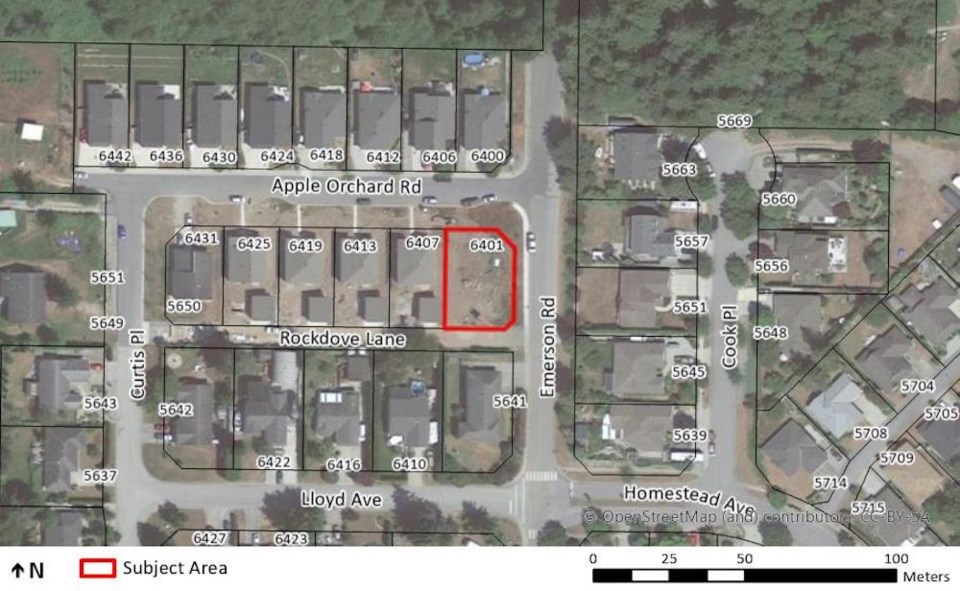A rezoning application before Sechelt council will be going to a public hearing in the new year.
At the Dec. 7 meeting, council members discussed a West Sechelt property, at 6401 Apple Orchard Road on an intersection with Emerson Road. Sven Koberwitz, a senior development planner for the district, noted the property is the last lot in a recently approved subdivision to be developed.
In their presentation, staff noted the property owner seeks to rezone from R2 residential low density to R4 residential for urban infill in order to allow the building of a duplex or single detached dwelling with a secondary suite. Staff also said the property is in a predominantly single-family neighbourhood, but the Official Community Plan (OCP) does support site-specific infill, and West Sechelt is located in a primary growth area for the district.
The proposed R4 zone was introduced in Sechelt’s Bylaw 580 (which was adopted at the previous council's last meeting on Oct. 6), and intended for a property that is more than 700 square metres with rear lane access. If granted, the allowed lot coverage would increase from 35 to 45 per cent. The R4 zone designation would also limit the overall floor area of the buildings to a ratio of 0.6 to a maximum of 435 square metres for this site, while the R2 zone does not have a floor area ratio and would allow a maximum of 508 square metres.
“...Under the current R2 zone the development potential of the property as far as building size and floor area is greater because there is no limit on floor area,” Koberwitz told council.
New public hearing provision
A recent amendment to the Local Government Act gives municipal councils the option to choose not to hold a public hearing in cases where an application conforms with the OCP.
Andrew Allen, Sechelt’s director of planning, said the new provision is meant to be part of Premier David Eby’s plan to expedite and support housing. While council has always had the ability to waive a public hearing if it complies with the OCP, the Act now requires a decision on whether or not a public hearing will be held to be made at the beginning of the process rather than two-thirds of the way through. Allen said it does not prevent engagement from the community.
“This is a test case for us, if you will,” Allen said.
Even if council chose to forgo a public hearing, public notification would still be required, Koberwitz told council.
Council discussion
Having received emails and concerns about density from people in the neighbourhood, Coun. Darren Inkster voiced either support of a public hearing or rejection of the proposal as is. Coun. Dianne McLauchlan said she agrees with Inkster, and is concerned about setbacks for the corner lot as well as potential rezoning for flipping. She said she does not support the location as appropriate for such rezoning but if the application goes ahead, McLauchlan spoke in support of a public hearing.
“I think the neighbours that have bought into that subdivision have accepted a certain type of house style design,” McLauchlan said. “I think in most single-family neighborhoods having a duplex is not something that they generally see as a positive offering.”
Coun. Alton Toth said he supports a duplex there and on every residential property in Sechelt, and agreed with a public hearing. Voicing his agreement with Toth, Coun. Adam Shepherd acknowledged that all the homes in the area are single-family homes and the council is under pressure from the province to build alternate forms of housing.
While Mayor John Henderson said he is not sure that he agrees with the concept of duplexes, he said, “We need to start accepting that we're going to have more density to be affordable, to be livable [as a community].”
He also noted that he doesn’t see a public hearing as a significant difference from receiving comments via emails, but added, “I think we need to be careful that we understand that a public hearing is not a process that results necessarily in rejection.”
A motion to proceed without a public hearing failed on the table as Inkster, Coun. Donna Bell, McLauchlan and Shepherd opposed. A separate motion to schedule a public hearing as well as give first and second reading passed with McLauchlan opposed.
Next steps noted by staff include review of community amenity contributions and, if the bylaw proceeds, a development permit for form and character followed by a building permit.


